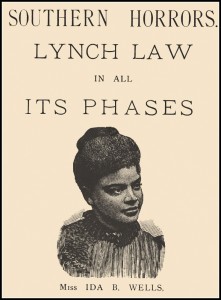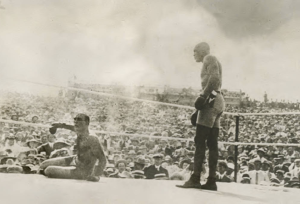Muckrakers
- Ida Baker Wells, Southern Horrors: Lynch Law in All its Phases, c. 1894 (Librivox link to eTexts and Podcasts).
- Jacob Riis, How the Other Half Lives: Studies Among the Tenements of New York, 1890 Muckraking journalism at its finest.
- Will Irwin, The American Newspaper/a>,Colliers Magazine series, 1910,
- Samuel Hopkins Adams The Great American Fraud a 1905 Muckraking era expose of “patent” medicine advertising. One example was Lydia Pinkham’s pills.Also Postum ads and the Postum cereal factory.
- Upton Sinclair, a prolific writer, was best known for The Jungle, 1904 but also the Brass Check, a critique of journalism as prostitution.
- Ida Tarbell, History of the Standard Oil Co , 1906; Steve Weinberg, “The unlikely muckraker who dethroned America’s robber barons,” Zocalo magazine, Feb. 2016.
- Lincoln Stephens Shame of the Cities 1904, The Shame of Minneapolis 1903, with an introduction by Mark Neuzil.
- The death of Joseph Pulitzer, 1911.
- Scott Nearing Great Madness and Closing Argument 1917. Nearing was the only person charged but acquitted under the Espionage Act.
- John Reed Ten Days that Shook the World , 1918; Also — Video: Reds with Warren Beatty as John Reed
- The Masses magazine
- H.L. Mencken The Scopes Trial (July 1925) Also, Mencken’s The Uplifters Try it Again (1925 editorial on Gun Control) and his Last Words (1926)
- H.L. Mencken 1948 interview about his life and times, concerns about effect of television and other issues. “When the boys of my generation were in college, listening to idiot lectures … I was a young (newspaper) reporter on the street, and I believe that a young reporter in a big city at that time (around 1900) led a life that has never been matched on earth, for romance and interest.” (Alternative site for the interview – https://www.youtube.com/watch?v=QpGzpqU-b04 )
- |Upton Sinclair End Poverty in California — 1932 Literary Digest article during unsuccessful campaign for Governor of California
- Undercover reporting — Web site by Prof. Brooke Kroeger about the history of journalism by deception, including the story of Nelly Bly in the madhouse and journalists who went behind confederate lines in the Civil War.
- Muckraking in Europe — Blaz Zigaga exposes Slovenia’s involvement in the Balkan wars of the 1990s.
Watergate
- Forty years later, Woodward and Bernstein recap the evidence. New documentation “makes it possible to trace the president’s personal dominance over a massive campaign of political espionage, sabotage and other illegal activities against his real or perceived opponents.”
- Investigative journalism in America is at risk, by Leonard Downie Jr., Washington Post editor, June 7, 2012
- The Watergate Story – Washington Post
- YouTube clips of All the President’s Men movie about Watergate.
- Carl Bernstein reviews biographies of President Richard Nixon four decades after his resignation. The biographies present “a fundamentally accurate and vivid picture of a criminal presidency … [but] there’s little of the tormented human being.”
- Woodward and Bernstein say the enemy of the people is not the press but government secrecy. April 30, 2017,
Literary and gonzo journalism
- Publication of Hiroshima in The New Yorker
- Hunter S. Thompson — Patron saint of Gonzo journalism.
- Review of Smoking Typewriters:The Sixties Underground Press and the Rise of Alternative Media in America By John McMillian. “Provocative pamphlets and lampoons go back centuries. Some forerunners of the Sixties underground were the broadsides of Tom Paine, abolitionist screeds, papers like “Appeal to Reason” and “Masses.” More immediate precursors were “I.F. Stone’s Weekly,” the journal “Dissent” and even “Mad.” “But more than any other publications, lower Manhattan’s ‘Village Voice’ and Paul Krassner’s satirical magazine the ‘Realist,’ helped to pioneer the kind of offbeat and subversive approaches that youthful journalists of the 1960s mimicked and amplified.”
Sports coverage
- History of Sports in Media -by Tom Malone
- History of Sports Journalism by Brian Moritz
- Outline of sports news in history, by JJ Gisondi for Robert McChesney.
- Sensationalism, sports and the popular press, by Richard Holt and Tony Mason, 2007
- Ring Lardner, “You know me, Al” (Podcast)
- The Nazi Olympics, 1936
- A people’s history of sports, Zinn education project
- The Johnson – Jeffries fight — 1910 — “Race riots ensued … across the country as a result of Johnson’s victory. Historians are unsure of the total number of people that were injured or killed during the riots. As a result of the uprisings, many communities banned the fight film to squelch additional violence. In 1912, Congress would pass the Sims Act that restricted interstate trafficking of boxing films. The law was enacted as a direct result of Johnson’s fight with Jim Flynn, which took place in Las Vegas on July 4 of the same year.” — University of Nevada.
- Jim McKay covers terrorism at the 1972 Olympics with intimacy and humanity.
- Bill Stern sports newsreels from the 1940s and 50s. Old time enthusiasm and storytelling.


